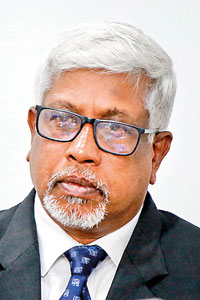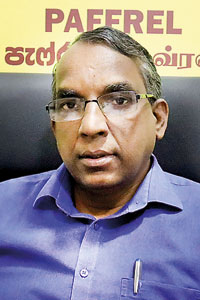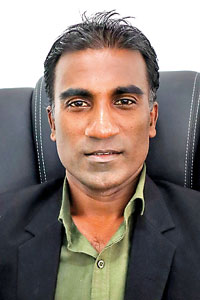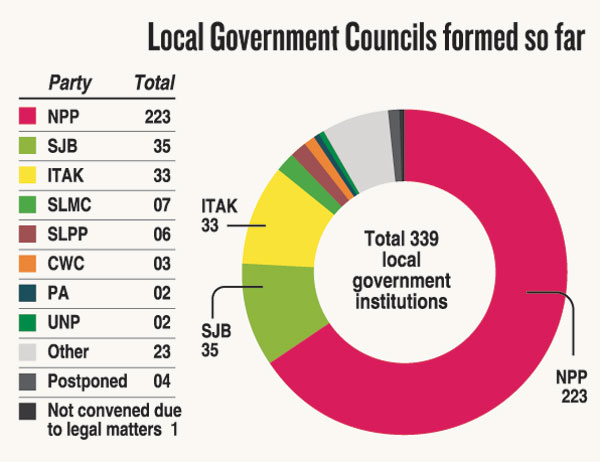News
Local councils, some mired in controversies, face challenge of getting down to work
View(s):By Ishu Bandara
Almost all local councils, barring five, have been formed, with a significant number of them shrouded in controversies after main parties solicited support of rival parties, irrespective of policy differences.
Many of the councils now face the challenge of carrying on with council work together with rival members in their camp.

Saman Sri Rathnayake
Commenting on this situation, Election Commissioner General Saman Sri Rathnayake told the Sunday Times, “Success for any local council should not be judged by the number of seats held by a party, but by how well it serves the needs of its community.”
Senior government officials in the management sector say many people do not understand the role of local councils. They explained that local councils are not governments or parliaments but bodies focused on serving local communities.
“These councils are not led by ministers or controlled by any single political party,” an official said. “Their role is to provide basic services to villages, such as repairing roads, managing waste, and addressing the needs of local residents.”
As a result, five councils are yet to be formed, while many others faced delays because of internal disputes over who should take control. Officials stress the need for better awareness and training to ensure councils function according to their intended role.
During the formation of local councils following the May 6 elections, the Sunday Times observed many incidents of harassment, verbal abuse, death threats, and even damage to public property across several districts.
These incidents have raised concerns about the conduct of post-election processes and cast a shadow over Sri Lanka’s democratic traditions. Despite the elections concluding with relatively minor violations, the chaotic and sometimes violent behaviour during the formation of councils has tarnished the overall image of the local government system.
Warning that such incidents could erode public trust in the electoral process Observers have called for stronger legal and administrative safeguards in the future during the transition period of forming local government councils.

Rohana Hettiarachchi
PAFFREL’s chairman, Rohana Hettiarachchi, said that the ongoing confusion regarding the formation of local councils and the appointment of leadership largely arose due to the action of certain politicians, political parties, and some provincial commissioners.
“Some provincial commissioners have unfortunately acted beyond their mandate, while political parties, particularly those struggling to secure control, have fuelled the chaos by challenging the process without following legal procedures,” he added.
“The law is very clear. The problem is, it’s simply not being followed properly,” Mr. Hettiarachchi explained. “The Election Commission has provided guidelines for local government appointments. The law clearly states that the decision to conduct a secret ballot or an open vote lies with the council members themselves, not with the commissioners.”
He noted that while provincial commissioners are tasked with facilitating the appointment process, they are not authorised to impose specific voting methods. However, there have been reports of certain commissioners allegedly asserting pressure to hold secret ballots in councils where no party had a clear majority.
One such instance that the Sunday Times witnessed was the indefinite postponement of the appointment of the Chairman and Deputy Chairman of the Seethawaka Pradeshiya Sabha following a dispute over the voting method.
The session, held under the supervision of Western Province Local Government Commissioner Sarangika Jayasundara, was halted after members clashed over whether to go for an open or secret ballot. The commissioner ruled in favour of a secret vote, prompting 24 members to walk out, resulting in a lack of quorum.
Despite a brief adjournment, the session could not proceed, and the council remains one of five yet to be formally constituted following the May 6 elections.

Manjula Gajanayake
A senior official from the management services told the Sunday Times that this turned into an issue because the local government commissioner in this instance was a woman. The official highlighted that similar voting method discussions took place in other councils, but such disruptions did not occur, suggesting possible gender-related factors coming into play.
Official data released this week shows that the Jathika Jana Balawegaya (NPP) has emerged as the dominant force in the local councils, securing control of 223 out of 339 local government bodies.
This makes the NPP the single most influential political entity in grassroots administration. The Samagi Jana Balawegaya (SJB) controls 35 councils, and the Ilankai Tamil Arasu Kachchi (ITAK) has control of 33 councils.
The breakdown shows that NPP has formed administrations in 21 municipal councils, 21 urban councils, and 181 Pradeshiya Sabhas, reflecting its widespread acceptance in rural and urban electorates.
The SJB’s control extends to one Municipal Council, four Urban Councils, and 30 Pradeshiya Sabhas. The ITAK, primarily active in the North and East, has managed to gain control of two Municipal Councils, one Urban Council, and 30 Pradeshiya Sabhas.
In contrast, the Sri Lanka Podujana Peramuna (SLPP) has secured only six Pradeshiya Sabhas. The United National Party (UNP) has been reduced to just two local authorities.
The NPP holds a commanding presence in all nine provinces, especially in the Western Province, where it controls 43 councils, followed by 40 in the Southern Province and 32 in the Central Province. Even in traditionally SLPP-leaning regions such as the North Central and Wayamba Provinces, the NPP has made inroads, controlling 26 and 24 councils, respectively.
In the Eastern and Northern Provinces, the ITAK has maintained its stronghold, particularly in Jaffna and Batticaloa, securing 19 and 7 councils, respectively, in these areas. Notably, the NPP also managed to secure several councils in these regions, indicating a growing multi-ethnic appeal.

The delayed convening of five local authorities due to legal and administrative reasons has caused concern among political observers. These are the Seethawaka Pradeshiya Sabha, Anamaduwa Pradeshiya Sabha, Pelmadulla Pradeshiya Sabha, Weligama Pradeshiya Sabha, and the Vanathavilluwa Pradeshiya Sabha, the latter being held up due to ongoing legal proceedings.
The ‘Mawubima Janatha Party’ and several independent groups have also gained modest control in 23 councils collectively, marking a shift in voter preference toward alternative and grassroots movements.
Despite the successful formation of most local councils, the Elections Commission and the Ministry of Provincial Councils and Local Government have yet to provide a full statement on the administrative delays affecting the five councils.
Election observer Manjula Gajanayake, Executive Director of the Institute for Democratic Reforms and Electoral Studies (IRES) told the Sunday Times that the ongoing formation of local councils has given the public a rare opportunity to witness the true nature of Sri Lanka’s political parties.
“This process has exposed the double standards of many political groups,” Mr. Gajanayake observed.
A separate legal dispute has arisen over the women’s quota in the Wanathawilluwa Pradeshiya Sabha in Puttalam, Mr Gajanayake told the Sunday Times. The Court of Appeal recently granted permission for a case filed by the Sri Lanka Podujana Peramuna (SLPP) to proceed and issued an interim order in the process.
He said that the dispute stems from alleged inconsistencies in the Election Commission’s (EC) application of the 25 percent women’s representation rule. According to regulations, the Wanathawilluwa council should include four women members.
However, only the SLPP and the Samagi Jana Balawegaya (SJB) are eligible to nominate women under the quota, as the National People’s Power (NPP) secured only ward-level seats.
Another political party has put forward a woman nominee despite her not qualifying under the established guidelines. The ECS subsequently instructed the SLPP to nominate all three remaining female members—a decision the SLPP claims contradicts the formula applied during the 2018 local government elections.
Critics have also noted that the EC has yet to provide a clear explanation for its directive, further fuelling controversy over the handling of the women’s quota. Additionally, there are concerns about practical challenges and inconsistencies in applying the Provincial Councils Act, which have complicated the functioning of local bodies.
The best way to say that you found the home of your dreams is by finding it on Hitad.lk. We have listings for apartments for sale or rent in Sri Lanka, no matter what locale you're looking for! Whether you live in Colombo, Galle, Kandy, Matara, Jaffna and more - we've got them all!

